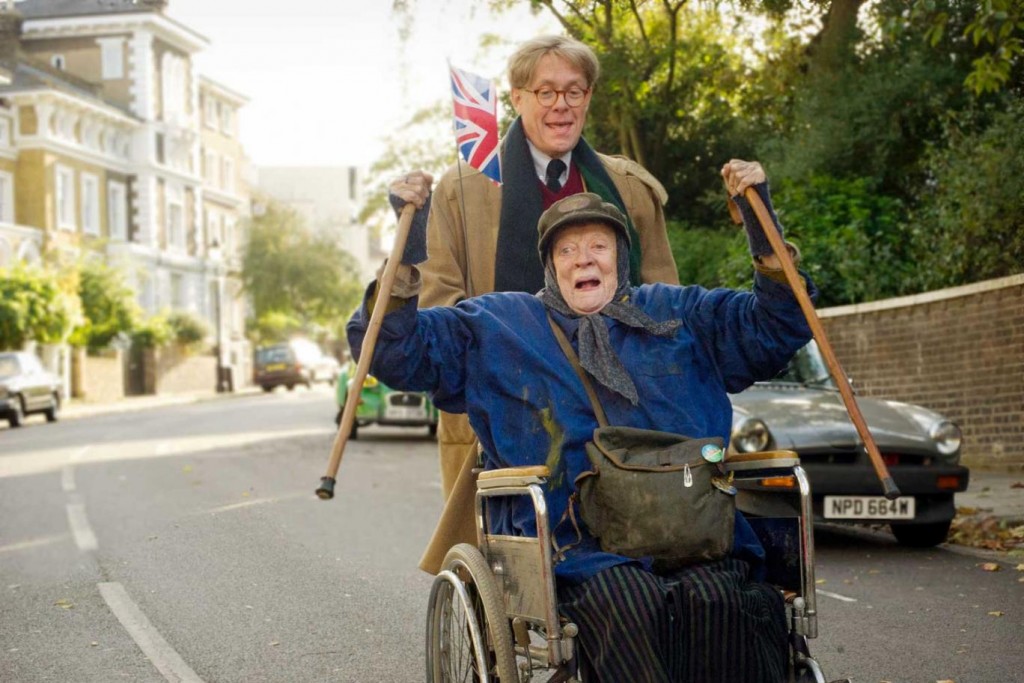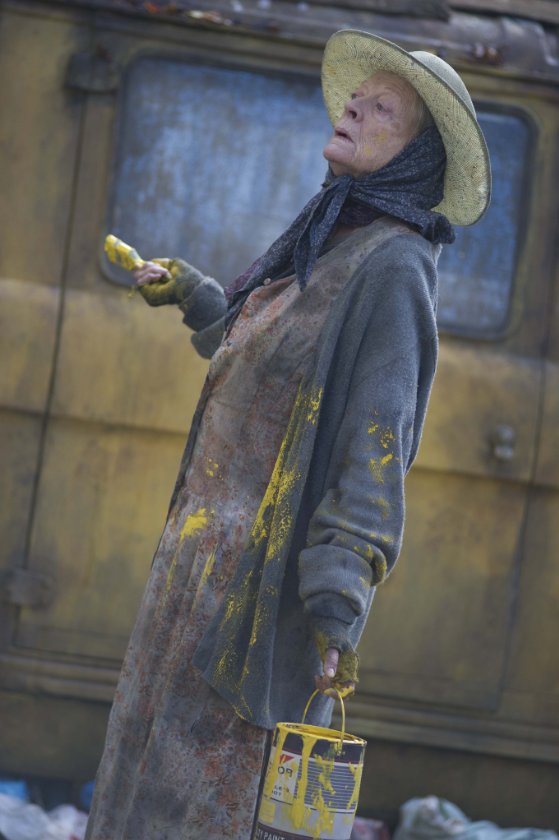Our guest blogger is hobbyist film and TV series reviewer and writer Harry Casey-Woodward. On th-ink.co.uk Harry will be writing a series of posts in which he will be sharing his opinions on things he has watched.
The Lady in the Van, 2015, cert 12A, dir Nicholas Hytner, 4/5. In cinemas now
I’ve hardly read any of Alan Bennett’s writing, apart from one of his Talking Heads monologues at school. But me and my sister grew up listening to his quirky, soothing Leeds accent reading Winnie-the-Pooh and Doctor Dolittle on our tapes, so I have a spot of affection for him. I now have some affection for Alex Jennings‘ portrayal of him in this year’s film The Lady in the Van, as well as the film in general.
The film is based (loosely, the film admits in a caption at the start) on events that actually happened to Mr. Bennett, which he turned into a play and screenplay. A homeless old woman calling herself Mary Shepherd, played by Maggie Smith, parks her van on Bennett’s street in Camden one day and after various interactions and disputes with his neighbours, road officials and loutish youths, ends up parking her van on Bennett’s drive for fifteen years.
This is the kind of film you’d expect from the BBC: a literary based drama set in the 70s/80s with seasoned actors like Dame Maggie and Jim Broadbent, and a bit of a cosy Sunday afternoon teatime feel. But that doesn’t mean it’s a bad film. As well as being a movie you could watch with your grandparents, the film asked some relevant questions about homelessness, social care and of course the process of writing. It is also genuinely funny in places and sad in others, or both at the same time in classic British style.
This is a film about two people: Alan Bennett and Mary Shepherd. Alex Jennings has been impeccably transformed into the author, complete with ginger hair and thick spectacles. His amusing and insightful voiceover echoes Bennett’s dry Northern tones so well it’s uncanny. In the film, the character of Bennett sees himself in a rather scathing light as a grumpy, solitary, unsympathetic bore, even though the film makes subtle nods to the author’s sexuality by having him invite various young men to his house. One of the film’s most playful features is having two Alan Bennetts flawlessly together on screen. According to the author, one is his living self and the other is his writing self and they rarely get on.
Bennett’s soft side surfaces when he’s confronted with Miss Shepherd, who he ends up looking after better than any of the other characters. He also deals with the deteriorating mental health of his mother. To his disgust, he finds himself comparing his mother to the batty Miss Shepherd, both of whom are old women under his responsibility. His two selves also argue over writing about Miss Shepherd. His writing self insists on writing about spies. It is fascinating and fun to have such a perfect physical manifestation of a writer’s mind, and to have insight into a writer’s debate on writing about real people.
As for Maggie Smith’s performance, it’s the best I’ve seen out of her yet. Her character is a delight to watch, over the top and full of life even though she can barely walk. She demands to be treated with dignity even though she behaves like a child, refuses all help and never thanks anyone who gives it. She is also a devout Catholic and uses God to justify her eccentric actions. At first she is comic, stalking up and down Bennett’s street, screaming at children, parking her van where she pleases and painting it custard yellow. However, her fluent French and conflicted interest and fear of music hint at more than meets the eye. There are also suggestions of darker, more tragic events in her past, besides her ending up homeless. The film is inviting us not to judge someone we’d perceive as a social misfit.
The way the other characters treat her is varied and an interesting comment on society’s treatment of homelessness in general. Bennett is not the only person to treat her with kindness, but he is one of the few to treat her with respect. Luckily, most of his Camden neighbours are quite relaxed about the new resident. However they still see her as either an amusement, someone to pity or someone to perform good deeds for in order to justify their own lifestyles, such as giving her Christmas presents or leftover crème brulée, or telling their children off for calling her smelly.
Other residents, mostly the men, see her as a nuisance. Others, mostly the young men, are very aggressive and some characters see her as someone to exploit, like Jim Broadbent’s slimy character who holds knowledge of some terrible crime Mary supposedly committed. Luckily, Alan is there to protect her and social workers do pop up to try and absolve her situation, while her nunnery who Alan appeals to want nothing to do with her. Nevertheless, Alan is openly annoyed when one social worker tries to teach him about a person they don’t have to cope with on a daily basis. The question of what to do with a situation like Mary Shepherd’s raises relevant issues in today’s society. Should we do all we can to change the lifestyle of someone like Miss Shepherd, even if it’s what she’s comfortable with, and make her a acceptable member of society? Or should we leave her where she’s happy, even though her health is at risk, her living conditions are deprived and she is exploiting people’s kindness? Thankfully this film does not set itself up as a moral parable but focuses more on the human relations of its characters.
The relationship that develops between Mr Bennett and Miss Shepherd is the most intriguing and charming element of the film. Bennett sees the woman as a curiosity, then a nuisance (especially when he has to clean up her stray poo which is definitely the grossest moment of the film). Yet he doesn’t have the heart to turn her away and begins to see her, not just as a grumpy old bat but as a victim of unfortunate circumstances striving for some dignity. Miss Shepherd at first sees Bennett as just another kind soul to exploit, but comes to depend on him. Both are stubborn and then humbled by each other.
So yes this film has thick dollops of heart warming charm and thus one or two slightly cringe-worthy scenes of sappiness. And yes at times it might be a rather warm, comic portrayal of the serious issue of homelessness. But there is still some relevance and genuine tenderness under this simple story of an unlikely friendship. Overall the filming is good, the acting is great and the movie is an all-round pleasant and moving experience that holds an unfortunately realistic mirror up to the social attitudes of twenty-first century Britain.



I have seen the film and think its one of the best i have seen for a while, great characters .Very entertaining.